The deep-down, ground-level sentiment on the part of righties who want Terry Schiavo’s feeding tube put back in? Anything, even life as a vegetable, is better than death. Human dignity and quality of life is never, it appears, a big concern of the Christian hardcore. The thing that gets their goat in this case is the importance of not sending a helpless, vegetative woman into the void, the black tunnel, the great howling nothingness of death…nothing is more terrible than this. The irony, of course, is that righties are always saying how sold they are on the concept of God and Jesus waiting at the end of that tunnel, waiting to greet the dear and departed, etc.
Day: March 22, 2005
Sin Peeks Out
I’m moderately cranked about seeing Frank Miller and Robert Rodriguez’s Sin City (Dimension, 4.1) tonight, and doing the junket tomorrow on Saturday.
I’ve also been feeling a tiny bit wary, like before any comic-book movie. Does each and every one have to be about breathtaking visual coolness above all? That’s been the basic deal all along…but if this was the core attribute of the original graphic novels, would they have such loyal followings?
I do, however, respect films that have the confidence to stand their ground and be what they are. And according to a certain Midwestern journalist who saw it earlier this week, a fierce emphasis and sureness of purpose comes out of Sin City like sweat.
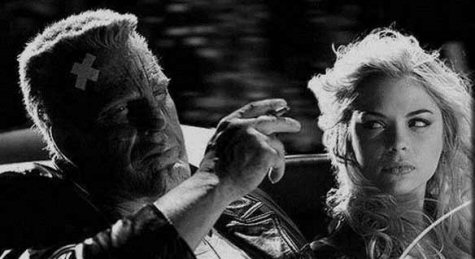
Mickey Rourke (l.), barely discernible, in Frank Miller and Robert Rodrigeuz’s Sin City.
Obviously, Sin City is going to be all about the sexy graphic aroma…the noir-to-the-max atmosphere…the relentless machismo…the hot slinky babes…those distorted faces all damp and glistening…know-it-all cool oozing off every frame.
The look and mood belong to Miller in terms of primal authorship, but the movie is also about Rodriguez doing the virtuoso hyphenate paw-prints thing…co-director, writer, cinematographer, editor, producer…so there’s a fairly uniform mentality.
< ?php include ('/home/hollyw9/public_html/wired'); ?>
“Sin City looks sensational,” Midwestern guy begins, “duplicating precisely the exaggerated flair of Frank Miller’s panel drawings. This in itself makes it the best big screen comic adaptation since Batman Returns. Hardcore fanboys will be panting for a sequel before the first reel is over.”
He also declares, however, that “anyone unfamiliar with the comic is gonna get the shit shocked out of them.
“Will the film’s relentless nihilism turn off at least as many as it turns on? I knew Rodriquez and Miller were sticking to the [comic book] panels, but never in my sickest dreams did I think bits like a cannibal getting quartered and eaten alive by a dog would survive the translation in all their stomach-churning, grinning-skull ferocity.
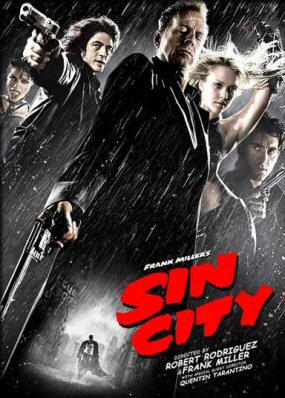
“This is one of the most violent flicks in a long time, more savage than Kill Bill or The Passion…way more brutal than anything Rodriguez has ever done (except, maybe, The Faculty), so expect a lot of hysterics from old fogies who don’t know that Frank Miller comics aren’t for kiddies. Or pussies.
“The film intertwines four of Miller’s Sin City arcs into a backtracking loop a la Pulp Fiction, but it serves them up in the style of a straight anthology.
“Besides the recurring characters, what connects Sin City is a grotesque fatalism verging on splatterhouse horror that would make Raymond Chandler bawl like a little girl — violence as a way of life, of recreation, with each inevitable comeuppance more tortuous than the last one.
“This movie doesn’t just celebrate vengeful bloodlust and steamy sex — it wallows in them, gorges on them, and then goes back for seconds.
“Rodriguez, antsy as ever, may seem to string together torture sequences as if violence alone constitutes plot progression, but there is also the grace of Miller’s gutter poetry, offering enough glimmers of humanity to round things out. Okay, so some of it sounds a bit purple at times. Kind of goes with the territory, no?
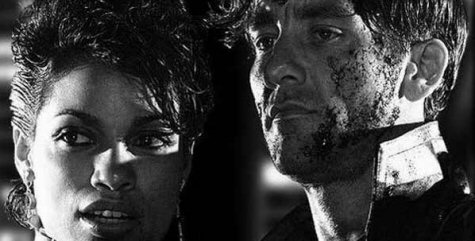
Rosario Dawson, Clive Owen
“The best segment, and the best ‘Sin City’ comic, centers on beastly manimal Marv (Mickey Rourke, in heavy Dick Tracy make-up) stalking strip clubs, alleys and one seriously creepy country homestead to avenge a murdered whore (Jaime King) who, for one sweaty night, made him feel human.
“Even behind all the granite-faced Thing prostheses, Rourke gnaws on the role, making by far the strongest impression out of the stellar cast.
“Of course, Rourke makes a strong visual impression too — so does Elijah Wood as a pale, mute, choirboy of a serial killer, and Jessica Alba, undulating luscious sweetness as a stripper with a secret. Bruce Willis with a scar on his head is still just Willis playing another cop, without the primitive, stylish pencil slashes Miller used to transcend archetypes.
“There are occasional hollow notes in some of the acting — especially from live wires like Michael Madsen, Benicio Del Toro and Clive Owen — that unfortunately recall Sky Captain sucking the life out of Jude Law and Gwyneth Paltrow.
There’s also, however, the intrigues of Josh Hartnett, Rosario Dawson, Brittany Murphy…whatever this film may be lacking, grungy-cool, perfectly photographed actors are all over it like a cheap suit.
“As internally-driven movies go, Sin City is probably as good an effort as Rodriguez is capable of, barring some sudden love affair with plot and directing actors and…I don’t know, feelings?
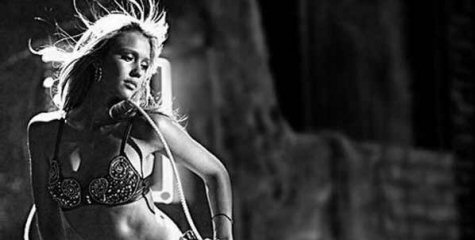
Jessica Alba
“The unrelenting grimness of Sin City doesn’t give Rodriguez much range to work with, but you can imagine Tarantino (whose guest- directed scene stands out for nil) or the young Sam Raimi punching up the black humor, drawing more than just entrails out of the characters.
“Everything Rodriguez has done since picking up an HD-cam looks and feels insular. He has seemed stuck in his head and his Austin home movie factory. His films lost some nerve when he walked out on the verite thrills of El Mariachi‘s streets and into a cubicle.
“And yet here and there, Sin City recaptures some of that living, breathing, thrilling danger. For the first time in a decade, I felt almost as enthusiastic about a Robert Rodriguez movie as the filmmaker obviously does.”
Master Blaster
It was roughly 32 or 33 years ago, in the midst of some digression in a piece about Last Tango in Paris, when Norman Mailer wrote a line that has stayed with me ever since: “the ass wind is our trade wind.”
Mailer wasn’t forecasting any trends (he was speaking about general fascination with celebrities) but he was still prescient. Ass winds are so prevalent these days that no one thinks about them, much less considers that it’s only been over the last ten or fifteen years that ass consciousness has been allowed out of the cellar and given access to the living room.
People have been laughing at fart jokes since the days of Euripides, but posterior attitudes and activities are subjects of somewhat wider usage and discussion these days. Fart jokes, thousands of anal sex websites, Howard Stern’s Fartman, scenes like the bedsheet accident in Trainspotting, Toni Bentley’s “The Surrender,” etc. I don’t know what it all means, but I know there’s an ass thing happening in the culture these days that wasn’t around 20 or 30 years ago.
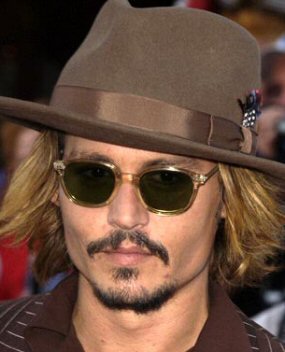
Johnny Depp
There is no way, I’m telling myself, that some of the anal imagery brought to mind by several big-name comics in Thinkfilm’s The Aristocrats (a doc about the same totally revolting, quite hilarious joke being told over and over again) would have been served up in a regular mainstream movie playing at your local theatre in the `70s or `80s.
Why bring this up? Because I was reminded yesterday that Johnny Depp was quoted twice in the `90s (once by a Vogue magazine interviewer, and then by a book author) as saying he would love to play Joseph Pujol, the greatest ass performer of all time. And I’m sensing…no, I’m certain the time is right for this.
Other actors have expressed the same longing to play Pujol, including Peter Sellers, David Niven and Ron Moody. The only one to have stood up and actually blown wind so far has been British character actor Leonard Rossiter.
But Depp would be perfect. Depp would kill. I can’t be the only one who believes that his starring in a movie about a true-life, Victorian-era superstar ass-blower would be huge.
Pujol, a pretty much forgotten belle √É∆í√Ǭ©poque Parisian entertainer known as “Le Petomane” (which translates into “the Fartiste”), had the ability to suck air into his anus and blow it out in such a way as to simulate on-key musical notes, imitate wildlife and blow out a candle from a foot away.
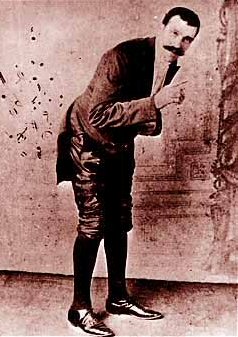
Joseph Pujol, a.k.a. “le Petomane” or “Fartiste”
Famed for having been a bigger draw than Sarah Bernhardt during his engagements at Moulin Rouge in the 1890s, Pujol was billed as “the Man With the Musical Derriere.”
Jim Dawson, the author of Who Cut the Cheese? — A Cultural History of the Fart (Ten Speed Press), writes that as part of his act, Pujol “would accompany an orchestra, farting well-modulated notes, on key, in the appropriate spots. He could also [make his ass] imitate the human voice, emitting a bass, baritone, tenor and lead parts, as well as the tones of his mother-in-law.
Pujol’s ass could also do “imitations of a little girl, a bride on her wedding night, and a dressmaker tearing two yards of calico.”
In the same book, Dawson apparently quotes Depp as saying, “You have to admire anyone with such great control of his instrument. I’d love to play him. It’s tragic that he left no successors. I’d play him in a minute.”
In a September 1994 Vogue interview, Depp told interviewer James Ryan that Pujol’s act was, to him, deeply impressive. “That’s courage,” Depp said. “A guy who says, ‘Here’s my talent…take it or leave it.’ Blows opera out his butt. That man was a true artist. I mean that.”
The story of Le Petomane has no tragic dips or turns. He got rich from ass-blasting, moved into a chalet with servants and had ten children. He died in 1945 at age 88.
I wish I could find a way to order a DVD of a 1998 documentary about Pujol, directed by Igor Vamos, called Le Petomane: Fin-de-Si√É∆í√Ǭ®cle Fartiste. (It’s mentioned online, but isn’t listed on Amazon or any of the other DVD order sites.)
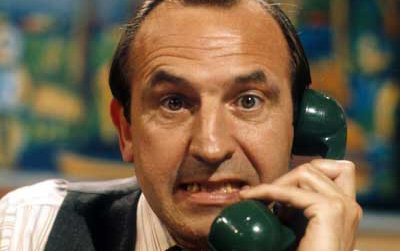
British character actor Leonard Rossiter
Rossiter (Barry Lyndon, 2001: A Space Odyssey) played Pujol in a 1979 short film called Le Petomane, directed by Ian McNaughton and written by Ray Galton and Alan Simpson.
An online review contends that Rossiter’s portrayal “was nothing short of brilliant. Although he didn’t produce the sound effects himself, his actions and intensity of concentration for each ’emission’ made it hard to remember that he didn’t.”
The same website claims that Sellers and Niven “had expressed great interest in playing Le Petomane. Both had found it hysterically funny and both were advised by their agents against doing it. Because of the nature of the subject it was thought that it would be bad for their image.
“Sellers wanted to do it, but he was advised against it,” according to either Galton or Simpson. (It isn’t clear which one is being quoted.) “They said it would ruin his image. And then it was offered to Ron Moody, who turned it down for the same reason. Leonard saw it and he said, ‘Ooh yes please, I’ll have some of that!'”
No more farting around — the time is nigh for Depp to step up to the plate and do this thing before he gets too old and loses his nerve.
I’m staggered, the more I think about this, that Depp hasn’t sat down with Tim Burton and tried to get a Fartiste film up and rolling. It’s right up their alley.
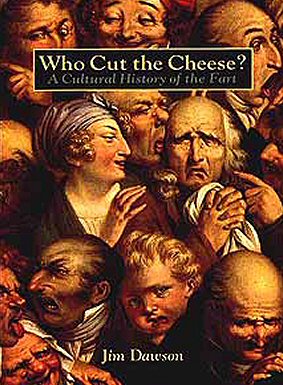
Depp’s UTA agent, Tracey Jacobs, wouldn’t get on the phone and tell me if any Pujol scripts have ever come in for Depp’s attention. A source who has spoken to Jacobs about this says no screenwriter or producer has ever put a script or money on the table.
The “Fartiste” film I’m imagining would have the chops and focus of another Ed Wood, only much more commercial. Who wouldn’t go to see it? People in their 80s? Depp is the hottest quirky actor of our times, and he’ll always need to do movies like this to balance out crap like Pirates of the Caribbean 2.
Something’s telling me Depp and Burton may want very much to do something a bit more impudent and challenging after the opening of Charlie and the Chocolate Factory (Warner Bros., 7.15). Those Michael Jackson echoes (or should I say “intimations”?) are creepy.
Buenos Aires
I flew out of Mar del Plata last Sunday around 12:30 and landed at the smaller, slightly east-of-downtown aeropuerto an hour later, and went straight into town to nose around and explore. I had about nine hours before my plane for Los Angeles was due to take off around 10:45 pm.
I left my bags at the Hotel Intercontinental and walked over to the Casa Rosada, the ornate, three-story presidential residence with the famed second-floor balcony that Eva Peron addressed her followers from. (The paint isn’t exactly rose — it’s more like a fleshy off-pink).
I walked around the San Telmo district and visited the open-air flea market. A big crowd was watching a couple dancing the tango. I gave them ten pesos when they passed the hat.

Casa Rosada
Director Fabian Beilinsky (Nine Queens) told me to go to a restaurant in San Telmo specializing in Argentine beef, called La Brigada (Estados Unidos 465). The aroma of perfectly-broiled steaks was transporting. I could tell right away it’s a class joint, although a bit too popular with the local swells. People were milling around outside and some kind of ticketing system was in place that I couldn’t figure out. I eventually gave up.
I then rented a bike and peddled all the way up to Palermo, in the eastern section of town. Palermo is the emerging hip section, like Manhattan’s Soho was in the early to mid ’70s. Buenos Aires is almost completely flat all the way around town, so biking anywhere is no sweat. You just have to be fearless about buses and crazy cab drivers. I figured I travelled about five or six miles, all in.
I ate at a small caf√É∆í√Ǭ©/restaurant on a quiet, tree-lined street in south Palermo, called Viejo Indecente (El Salvador 4960). It has an alternate name of Maldito Salvador, which is what it’s called on the business card and on the website .
There was an attractive woman with Tourette’s Syndrome sitting behind me. She didn’t seem to be swearing as much as shouting. It was kind of a cross between a loud scream and a loud sneeze. (“Aaaggghh“!) I kept asking myself as I ate, “Do I want to move outside or something?”
Buenos Aires is a flat, somewhat hot and sweaty city with superb restaurants and deeply beautiful women, some with bedroom eyes and many with long slender toes. The best part for me was the absurdly low prices. Everything is one-third the cost. It put me in the greatest mood not to have to spend any serious money. I felt like a trust-fund kid.
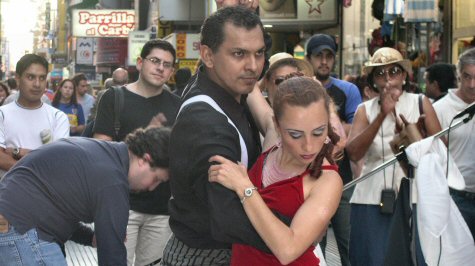
I drove past the brick-walled cemetery where Eva Peron is buried, and the whole area around it was covered with T-shirted tourists, swarming all over like ants. The nearby restaurants were all cheap fast-food joints (McDonald’s, etc.). The vibe felt lurid and grotesque. I peddled on without stopping.
B.A. is very much the bustling, pulsing place — crowds, music, culture, intensity — but the buses spew out exhaust like there’s no tomorrow, and you’re forced to breathe in the fumes as you’re peddling along, and with all the heat and clamor and the lack of much in the way of old-world architecture I began to conclude that Buenos Aires isn’t as sexy or intriguing as Paris, Rome or Prague. Or Berlin, even.
But at least it’s gritty and alive, and I’m sure it’s a richer thing for X-factor people who live and work there and congregate at the right places.
Hollywood and 9/11
“I was absolutely horrified and fascinated with William Langerweische’s short description of Buzzelli’s story at the end of your Wednesday column. In a way I could imagine myself in this situation, and it felt terrifying. In a weird way it was riveting, of course, but it was perhaps the most gut-wrenching thing I’ve ever read. I had to stop at one point to catch my breath.
“I have no doubt there’s a great story there, but is it a really a movie, with a plot, three acts, etc? I haven’t seen Fearless, only parts of it on TV, but I think I can imagine the structure of it from what I’ve seen.
“With Buzzelli, I believe that as a two-hour movie, we could have a really great part there in the reenactment of his experience, but what about the rest of the movie? I think to show us his reactions prior and after the experience could somehow cheapen it, since it’d be treading into somewhat familiar territory. Besides, what can possibly be said about his experience?
“The really fascinating aspect of the story is what happened during those few hours on 9/11. I can see a wonderful documentary being made about what he went through, maybe in the vein of Touching the Void, but a movie with actors, a script, etc? I really don’t see it.

“Well…. maybe if Terrence Malick directs it? He’s more of a man-nature relation kind of director, and he’d be working in a very urbane setting, so maybe someone else who could give it that Malick humanistic approach? Well, anyway it’d have to be a damn good and special director and script.” — Fabio Augusto, Sao Paulo, Brazil.
“I guess it was inevitable, and I don’t think any tragedy should be so sacrosanct that we tip-toe around it, but does anybody really want to see a 9/11 movie?
“Sure we’ll go, but who wants to sit there and deal with the headache of analyzing the dialogue, the direction, the special effects, the casting, the score, and the overall vibe of a recreation of one of the worst days of all of our lives?
“Seriously, I’m already hearing myself think, `The second act was really intense but I kinda didn’t like Eric Bana’s character and the Hans Zimmer was a little overdone, especially after the first plane hit.’ And I don’t even want to think about Brian Grazer’s The 9/11 Commission Report: The Miniseries on ABC with commercials and pop-ups for Desperate Housewives.
“I’ll admit that some of the art that has come out of the tragedy has amazed me. The HBO documentary about 9/11 is absolutely fantastic, and there’s an amazing show about the Twin Towers (it describes the science behind the structures’ collapse and in which members of the staff, who were interviewed just before 9/11, are labelled `died in the attacks’ or `missing’) and I still get chills when I channel surf into the opening sequence of Spike Lee’s The 25th Hour.
“But, c’mon, do we really need this already? It’ll be forever before we figure out what the whole thing really means. Can’t we take a decade to assimilate the experience and let the whole thing cool, or is five years all we get? ” — Neil Harvey, Roanoke, Virginia.
Wells to Harvey: Five years….all right, maybe six…is all you get.
“Great job on those 9/11 movies. I think Buzzelli’s story is fascinating, and I believe you are right about the dramatic content in comparison of the two different rescues. His is more absorbing, and the other is a little familiar.” — Jim Kiehl
“Whatever 9/11 Hollywood movie gets made, it would be more realistic if they would show the actual horrors of this heinous, cowardly attack by the Islamofacist Al Qaeda bastards who flew those planes into the Twin Towers.

“Probably, sadly, the real 9/11 movie will never be made. After all, there are those in Hollywood who see terrorists are misunderstood freedom fighters with a beef against decadent America, and not as cold blooded killers. ” — Bill Hodges
“Who’s to say which is the “more important story of 9/11, anyway? You? Me? William Langeweische? Anyone. really? I can write this with a certain (very modest) degree of credibility because I happen to be a 9/11 “survivor” myself.
I was working that day on the 5th floor of a five-story building two blocks from the WTC. After the first plane hit, I went with an art director named Raoul up to the roof. There we collected weird stuff that wasn’t on the roof the previous day, when we’d had lunch there. What we found was little metal versions of old Tinkertoy sets, if you remember them. But they were hot to the touch.
“And then, in very close-up straits indeed, we saw the second plane hit. Nose-in and full-on. What I remember most is the sound — an amazingly loud, all-encompassing combination of [unintelligible] and a crunch, as if the very fabric of our existence was caving in. I can still hear that sound.
“I remember how everyone in midtown NYC, once I’d walked up there from downtown and found the bus terminal closed, seemed to be wandering dazedly through the streets. They couldn’t get home and they couldn’t comprehend how horrible things already were, how worse they’d turn out to be. I remember being with thousands of other people looking at a huge TV in Times Square which was showing CBS News, and finally realizing what the famous phrase `the lonely crowd’ really meant.” — Richard Szathmary.
Wells to Szathmary: I didn’t say Buzzelli’s story was “more important” than what happened to Jimeno and McLoughlin. I said their story seems familiar and doesn’t seem to be much more than a standard let’s-dig-these-guys-out rescue tale. I also said it “doesn’t have anything like the surreal, full-throttle, hand-of-God quality of what happened to Buzzelli.”
Translation
“Would it really have hurt you or Jon Doyle, the writer of your DVD column “Discland,” to call Michelangelo Antonioni’s film Eclipse as opposed to L’eclisse ?
“Obviously the Criterion Collection people are spelling it that way, but it just sounds so damned pretentious. Besides, it played in the US as Eclipse, to the best of my memory.” — Richard Szathmary
Wells to Szathmary: I wouldn’t have had a heart attack if Criterion had called it The Eclipse on the DVD. But would you also have them change the title of Antonioni’s L’Avventura and make it The Adventure? That would sound, like, way uncultured.

Alain Delon, Monica Vitti in Michelangelo Antonioni’s L’eclisse.
Except for the Spy Kids
Except for the Spy Kids flicks, I know I can always count on Robert Rodriguez to get actresses in his films to take their clothes off…so I was into seeing Sin City for this, and, of course, for the promise of scrumptous black-and-white cinematography. But take no notice of anyone (Rodriguez included) calling this a film noir flick. There is real film noir — crime movies made with a downbeat fatalistic attitude, and grounded in a reasonable facsimile of human truth — and there is simplified noir lite for chumps. By this I mean noir archetypes mixed in with hardboiled machismo, Mickey Spillane-type dialogue, slinky man-eating dames and superhero action bullshit with guys taking four or five bullets in the chest and still breathing, or jumping from 30-story buildings like they’re Batman (which never worked for me either…the Dark Knight can float down to the street from the top of a skyscraper because he’s wearing a large leather cape?). This is noir as re-imagined by Frank Miller and digested by comic-book geeks in their 30s who live in their lonely heads and haven’t gotten laid very much or gotten to know women at all. That said, Sin City has some of the most beautiful black-and-white compositions I’ve ever seen. It looks like it was shot on silver nitrate stock, and feels every inch of the way like a pure monochrome high…two hours of silvery shimmering bliss. That is, except for the tedious stuff, which is relentless.
It was sorta kinda predictable
It was sorta kinda predictable that Jamie Foxx would get an outstanding actor trophy from the NAACP Image Awards for his Ray performance. Okay, he deserved it and all, but the honor is definitely a little “yeah…so?” at this stage. The Oscars are the last stop, the final crescendo…enough already.
I wish I’d taken the
I wish I’d taken the time today to write something longer about the coolest and classiest DVD out there right now…one of the most disturbing, penetrating, transcendent art films ever made: Michelangelo Antonioni’s L’eclisse, which the Criterion Collection has just brought out on a special double-disc edition. I’m not an Antonioni scholar (I’ve never even seen La Notte), but this 1962 film — the conclusion of his Italian alienation-and-desire trilogy — is flat-out masterful. The genius element? There’s no story whatsoever. It’s purely a meditation about indifference, drifting, emptiness, ennui. I have never felt such a profound sense of nothingness — such an immaculate, beautifully composed void — from any other film, ever. L’eclisse is nominally about Vittoria (Monica Vitti)breaking up with her brooding novelist boyfriend (Francisco Rabal) and drifting into a new relationship with an attractive stock trader (Alain Delon). The film’s seven-minute finale — a succession of locations where Vitti and Delon have met and shared whatever during their brief affair — is justifiably famous. On the second disc there’s an excellent 60-minute documentary called “Michelangelo Antonioni: The Eye That Changed Cinema.”
Melinda and Melinda is Woody
Melinda and Melinda is Woody Allen’s best film, I feel, since Mighty Aphrodite. But it’s not one of his very best, and he’ll probably never get back up there to Manhattan or Crimes and Misdemeanor-land until he hooks with a co-writer, preferably someone a good 25 years younger. Allen is almost 70 and he just isn’t getting the world as sharply as he used to. He needs a younger guy (or woman) to challenge him and give his scripts some zip, and that’s not a tough pill to swallow. He partnered with Marshall Brickman on Annie Hall and with Douglas McGrath on Bullets over Broadway…so it’s not like this is a new concept.
